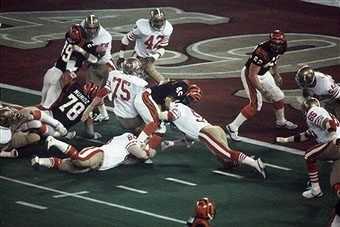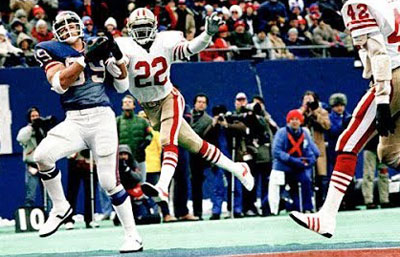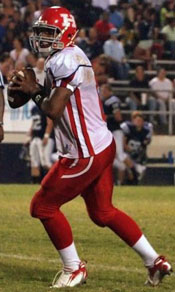
Dak Prescott at Haughton High
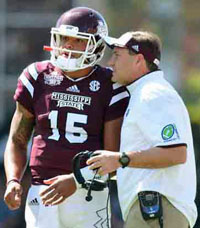
Prescott and Dan Mullen
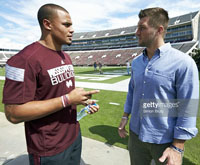
Prescott and Tim Tebow
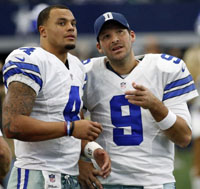
Prescott and Tony Romo
|
Dak Prescott
This profile is based on an ESPN the Magazine article on Cowboys QB Dak Prescott during his sensational rookie season (2016).
- When he was eight or nine years old, Dak proclaimed, "I'm going to win the Heisman Trophy and I'm going to play for the Dallas Cowboys." (His affinity for the Cowboys is explained by the fact that Dak grew up in Haughton LA due east of Shreveport. Folks in that part of Louisiana watch the Cowboys games on TV rather than the Saints.)
- Dak often played tackle football (without pads) with his older, bigger brothers and their friends. When 6-year-old Dak took a nasty hit, it started a fistfight between his oldest brother and the guy who delivered the blow. Dak went running to his mother, who raised him as a single parent. "Don't come in here crying," Peggy scolded. "If you can't run with the big dogs, stay on the porch."
- At Haughton High, Dak played the spread offense that required him to both run and pass. His toughness was confirmed when he threw for nearly 400y while playing with a torn MCL. He also impressed coaches with his ability to connect with everyone on the team. (He once made sure Haughton players carried an autistic team manager off the field in the boy's final game.)
- However, the major programs questioned whether Dak could become a big-time QB. LSU recruited him as a TE at first. "I don't think that sat well with him," says Haughton's head coach at the time.
- Mississippi State, however, wanted Prescott as a QB. By the time LSU decided to recruit him as a QB, it was too late. MSU had a big advantage because head coach Dan Mullen had been Tim Tebow's offensive coordinator at Florida, and Tebow was Dak's favorite player. Mullen told him, "If you want to know more about me, call Tim Tebow." Says a friend, "Dak's love of Tebow was more about his character, his leadership, how he gave 100 percent all the time and put the team on his back." Prescott even had a dog named "Tibeaux."
- At Mississippi State, Dak modeled his game after Tebow's. He even wore Tim's number 15. Prescott threw for more than 9,000y and rushed for more than 2,500y. He also emulated Tebow by his "generosity of spirit."
- Dak quickly became known as a "relentless grinder in the weight room and film room." His brother Tad remembers Dak reviewing plays on his laptop for five hours of an eight-hour round trip to visit their grandmother. "Dak wanted to understand how to beat teams with his mind," says Brian Johnson, his QB coach in Starkville. "He wrote down his goals before each season, and he wanted to master the game. Dak's got an extensive memory bank where he can recall things, and if you go back and clearly watch the film, you'll see him at times appropriately getting to the fifth read in his progression."
- All this made Prescott NFL-ready although pro scouts didn't see it that way. "Despite his success on a roster of three-star recruits pitted against some SEC powers that had five-star recruits on the bench," Prescott was compared to Tebow, "a wobbly-armed first-round pick who won a playoff game in Denver but was out of the league in three years."
- Prescott carried the Bulldogs to the school's first-ever No. 1 ranking in 2014, less than a year after his life's inspiration, his mom, died of cancer.
- Of course, Dak is the Cinderella Story of the 2016 NFL season, leading the Cowboys to a 7-1 record after replacing veteran Tony Romo, who went down in the preseason.
- One of Dak's admirers is none other than Cowboys Hall of Fame QB Roger Staubach, who called Dak "a wonderful QB for the future. You can tell that the players respect the heck out of him and that he's already a leader. He is amazing at making decisions when ... there's a difficult situation there, and he needs to dump the ball off. He also can throw to lead a receiver."
- Another admirer is former Cowboys coach Bill Parcells. "I'm so impressed with this young man; he's done a tremendous job. But he hasn't been down 14 points yet. [Dallas did trail 14-0 early in Week 4.] He hasn't thrown four INTs yet and then had the press and the fans getting restless and the players looking at him sideways, and maybe his nose is broken too. That's when you find out about a QB."
|
Bill Walsh - I
Bill Walsh's road to a head coaching job in the NFL was more circuitous than most.
- William Ernest Walsh was born in Los Angeles November 30, 1931, at the height (or depth) of the Great Depression.
- Bill characterized his father as a "lout" who stayed distant from his children.
- Young Walsh played various sports, including baseball, basketball, and gymnastics, but football was his favorite.
- His high school gridiron career was disrupted by two family moves, first to Oregon, then to the San Francisco Bay Area.
- His senior year took place at Hayward High School in 1949. Bill wanted to play QB, but two veterans blocked his road. So he played HB on both sides of the ball.
- His coach noticed early on that young Bill knew not only his own position but every other position on the field. Recalled one of his teammates: Football is a lot of instinct, and he had those keen instincts even back then.
- Off the field, Bill was an extremely jovial and carefree guy who loved to party.
- In 1950, he became the first in his family to graduate from high school.
He entered San Mateo Community College, where students with limited finances could start on a college degree.
As his discharge date approach, Bill tried to figure out what he could do to support his family.
- He considered boxing professionally but rejected that idea as impractical.
- That left coaching, his real interest.
- So the Walsh family returned to San Jose in 1956 so that Bill could enter a master's program in the P.E. Department.
- He put food on the table by doing odd jobs like pumping gas and umpiring high school baseball games.
- His 192-page master's thesis was entitled "Flank Formation Football, Stress: Defense." His faculty committee complained that he included only one footnote. But fortunately his faculty adviser was his former coach, Bob Broznan, who informed the professors that no one had ever written on the subject before.
Armed with his master's degree and a California teaching certificate, Bill joined the faculty at Washington Union High School in Centerville (now Fremont) CA.
- He made $4,650 to teach PE, be head coach of the football team, and drive the team bus.
- The team he inherited had lost 26 of its last 27 games. But Bill arrived at a propitious time when a population boom increased the Washington Union enrollment from 750 to 3,000.
- The new coach immediately installed what he called "the Walsh offense." In those days, Bill remembered, almost all football coaches were afraid of the passing game. People thought it made you weak, that you couldn't have a tough team if you passed too much.
- His players loved the new system. One recalled, Everyone was running three yards and a cloud of dust. Under him, we ran three wide receivers, a lot of motion, and sprint-out pass pattern. Most teams we played only had two receivers in the pass patterns. We had three to five every play. ... At that time everybody played a three-deep zone defense. He really attacked that area. He'd flood the zones with two or three receivers.
- Students also liked the manner in which Walsh treated them in PE class and on the football field. The basketball coach noticed that Bill's PE classes had more fun than anyone else's. I couldn't figure it out so I watched him teach one day and what I saw was that he treated everybody in the class with tremendous dignity. Little fat guys who hated to dress out and hated to come to class all dressed for his class and were glad to be there because he treated them with great respect. It wasn't just the ... good athletes. He treated everybody the same way.
- The result on the gridiron was a rapid improvement in victories: four the first season - the most in ten years - then eight against no defeats and a chance to play for the Bay Area championship, the result being a heartbreaking defeat.
Bill's Huskies lost when a back ran the length of the field for a sure TD only to fumble at the other team's goal line. A defender picked up the ball and ran it back the the other way for the deciding score. Almost 50 years later, Walsh would still replay that game in his mind and wonder what he could have done to change the outcome.
|
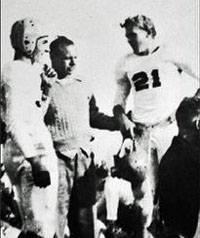
#21 is teenager Bill Walsh.
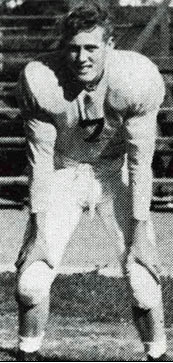
Bill Walsh in college
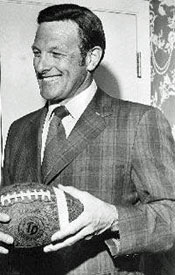
Bob Bronzan
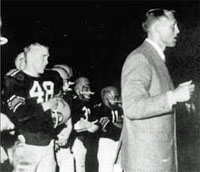
Bill Walsh coaching Washington Union High
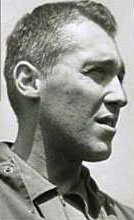
Marv Levy, head coach of the California Golden Bears
|
Word about the dynamic young coach spread to Marv Levy, the new head coach at California.
- The future coach of the Buffalo Bills hired Walsh for his staff. The increased salary came at an opportune time as Bill's family gained a new addition, Craig.
- In three years at Cal, Bill rose to become defensive coordinator. But Bill moved up too quickly, by his own assessment. I wasn't ready for the job, and I floundered a bit. To be honest, I made a fool of myself trying desperately to succeed before I was really ready. I was, in many ways, an immature young man.
- Through it all, Walsh applied the same approach he had developed in PE class. There was this religion of "toughness" in coaching circles those days, and all coaches were trying to be like marine drill sergeants and scare people into playing well. I got caught up in that for a while, but I concluded it didn't come close to working. It was a kind of mass delusion. All the coaches thought the players loved them despite how badly they treated them, and all the players were doing was putting up with the coach so they could play football. Instead of loving and revering the coach, they couldn't stand him ... but they wanted to play football. They wanted the fellowship, ... they wanted the excitement, and only put up with the bullying because they had to. Most played football in spite of the coach. By the time I left Cal I had decided that if you taught people to play the game better, that was real coaching - being a teacher rather than a thug.
Bill's next job took him across the Bay to Stanford, where John Ralston assembled an impressive staff of young coaches.
Continued below ...
Reference: The Genius, David Harris (2016)
John Ralston assembled an impressive staff at Stanford for the 1963 season.
- Ralston met Bill Walsh at a coaching clinic and coached against him when Bill ran San Jose State's JV team. He thought Walsh was "brilliant."
- Bill's assignment was to coach the defensive backs.
- Two other future head coaches served on the Stanford staff during Walsh's tenure there:
Mike White - future head coach of California and Illinois
Dick Vermeil - UCLA, Philadelphia Eagles, St. Louis Rams, Kansas City Chiefs
- Earning $7,500 each, the assistants lived in the same area and became good friends, as did their families. They worked long hours. Walsh's son Steve recalled, Hour after hour and night after night, Dad would be sitting in his den watching film. You'd want to say, "Let's go do something." But there was just no point in arguing because you couldn't win.
- Vermeil recalled, As a football thinker, Bill was always ahead of the people he worked with. So he was always frustrated at being held back.
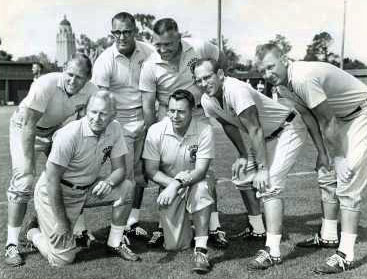
1963 Stanford staff, with John Ralston kneeling in the center and Bill Walsh at far left
Walsh's next stop was the NFL in 1966.
- The job came about as a result of meeting Oakland GM Al Davis at a banquet. The two spent an hour talking football in the parking lot afterward.
- Davis hired Bill to be RB coach on John Rauch's staff.
- Bill would later say that he learned more football that year than he had in the previous decade. Davis had developed his ideas about the passing game while serving as an assistant to the legendary Sid Gillman of the Chargers. Bill would later say that what he imbibed with the Raiders would form the foundation of my philosophy of offense. The first coach to use the pass as his primary weapon, Gillman believed in using the entire field horizontally and vertically. It was a fully dimensional approach, explained Walsh, utilizing the backs and TEs much more extensively than other offense. A typical NFL team might have three of four pass patterns for the HB, but the Raiders' system had as many as 20 ...
- However, he paid a price for that knowledge. The hours he put in at Stanford paled in comparison to his work load with Oakland. The family had continued to live in Palo Alto while he commuted across the Bay to Oakland. You couldn't have a home or family under those conditions, Bill recalled. It became clear to me I might very well lose mine if I kept on like that. His wife Geri made it clear to him that she couldn't continue like that.
So Bill resigned his job with the Raiders with the intention of leaving coaching.
- There had been little financial reward or career developments to offset the sacrifices I had made, he decided.
- He applied to the Stanford Business School. He taught a class at San Jose State and oversaw the San Jose Apaches, a minor league team in the Continental Football League.
An out-of-the-blue phone call changed those plans.
- Paul Brown, the Cleveland Browns coach who, more than anyone, made "professional" football professional, had been fired by new owner Art Modell following the 1962 season.
- Brown got another chance to coach when the Cincinnati Bengals became an expansion team of the AFL in 1968.
- Walsh was stunned when Brown invited him to be a member of his staff. Looking for someone to help him develop a passing game after his first choice turned him down, Paul had heard about Bill from several friends.
- When Walsh flew to Cincinnati for an interview, the Bengals head man offered him $20,000 a year. Now all he had to do was convince Geri that this was the opportunity he had been longing for.
- She consented, and the family moved to the Midwest. A lifelong Californian, Bill said he hadn't known exactly where Cincinnati was in Ohio until he came there to meet with Brown.
More an administrator than a head coach, Brown gave his assistants wide latitude. He increased Walsh's responsibilities year by year.
- Bill started as receivers and tight ends coach.
- QBs were added to his purview the second year.
- In year #3, Walsh served as de facto offensive coordinator.
The offense Bill developed can be described as combining the essence of Brown's old system with Cleveland with the Gillman approach.
- Walsh wanted his QB to get the ball away quickly to receivers running short timing patterns. The passer threw the ball to a predetermined spot even before his receiver made his cut. He also flooded zones with as many as five receivers.
- His players praised Bill for being precise and detailed in his coaching. All three of the QBs he coached at Cincinnati led the league in completion %.
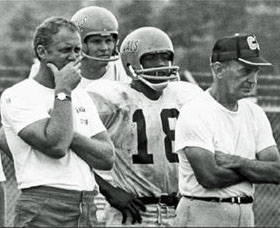
Bill Walsh with Paul Brown at a Bengals practice
- During games, Walsh sat in the press box, told the play to an assistant sitting next to him who would use the phone line to an assistant on the sideline, who would relay the call to Brown on the sidelines. Using the system he invented at Cleveland, Paul sent in a messenger to the huddle with the play Bill called.
- Bill recalled: It was the most inefficient, cumbersome process imaginable, but it preserved the fiction that Paul was pulling all the strings. Since observers saw only what was happening on the sidelines and the field, Brown received credit for the offense's success even though, as Walsh said, he wasn't even sure what the system was.
- Walsh accepted the arrangement because Brown, for whom he had developed a genuine fondness, had given him the opportunity of his lifetime. Bill even described the venerable head coach as his "mentor."
- For his part, Brown became even more cold and aloof than he had been in Cleveland. Still, he gave Bill a $6,500 raise for the fourth year of his tenure, telling his chief offensive assistant, "You know what I had in mind." Walsh took that to mean that he would replace Brown as head coach whenever the old man decided to retire to the front office.
The Bengals improved each of their first three seasons in the league.
- They went from 3-11 in '68 to 4-9-1, then 8-6 and a playoff berth.
- After dropping to 4-10 in'71, they rebounded to finish with a 8-6 mark in '72.
- They made the playoffs again in 1973 after posting their best record yet, 10-4.
- But their up-down pattern continued the next two years. They regressed in '74 to 7-7 before making the playoffs as a wild card for the third time in '75 with an 11-3 tally. But once again, they lost in the first round.
And that's when a monkey wrench was thrown into Bill Walsh's plans.
To be continued ...
Bill Walsh - III
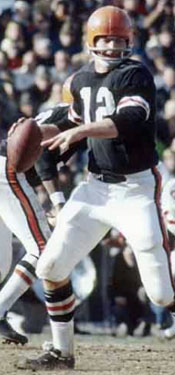
Greg Cook
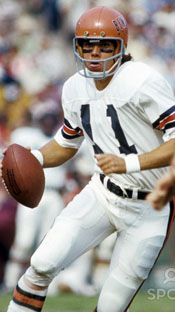
Virgil Carter
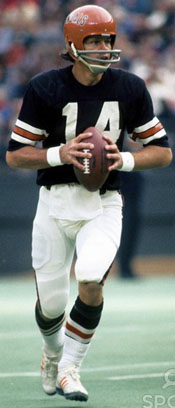
Ken Anderson
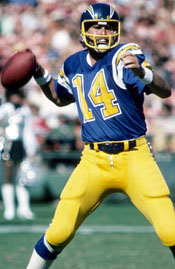
Dan Fouts
|
As an assistant to Paul Brown with the Cincinnati Bengals, QB/Receivers Coach Bill Walsh started to develop what later became known as the "West Coast Offense."
- It began as a matter of necessity to fit the talents of QB Virgil Carter, who possessed great mobility and accuracy on short passes but lacked the strong arm needed for deep passes. Carter was forced into action during the 1970 season to replace strong-armed Greg Cook, whom the Bengals had drafted in 1969 to be their franchise QB just as Otto Graham had played that role for Brown in Cleveland.
- Cook earned the Offensive Rookie of the Year award for the '69 season. But that would be his only full season in the NFL. He was knocked out of action with a severe injury to his throwing shoulder in the third game of his rookie season. Medical science of the time failed to diagnose the injury as a torn rotator cuff. After missing several games, Cook returned and, playing in pain despite cortisone shots, fashioned a season good enough to earn him the Offensive Rookie of the Year award for the season.
- However, off-season surgery revealed that, in addition to the shoulder damage, Cook also had a partially detached biceps muscle. After three operations failed to correct the problem, Cook retired after playing just one more game in 1973.
Even after coaching Joe Montana and Steve Young with the San Francisco 49ers, Walsh still rated Greg Cook as the most talented QB he had ever coached. Cook had the vision of Montana with the athleticism of Young plus two inches of height on either and an arm that was much stronger than either of them.
- Stuck with Carter, Walsh modified the vertical passing game he had learned with the Oakland Raiders to rely on quick, short throws to receivers spread almost from sideline to sideline. With an offense tailored to his strengths, Carter led the NFL in completion % in 1971.
- Walsh also identified Ken Anderson of tiny Augustana College as an even better candidate to run the offense than Carter. Taken 67th in the 1971 NFL Draft, Ken took over at QB when Carter suffered an injury in the first game of the '72 campaign.
- Walsh honed his ideas even more with Anderson at the helm, turning him into one of the most accurate short-range passers in the league.
Anderson would fashion a 16-year NFL career highlighted by leading the Bengals to the Super Bowl in 1981.
Walsh bided his time and let Brown receive credit for the Bengals' offensive success.
- Bill had every reason to believe he would succeed the coaching legend when he retired from coaching and concentrated on being GM. Unfortunately, Walsh had read too much into Brown's intimations.
- Walsh recalled: After four or five years with Paul Brown, I realized I was ready to be a head coach. I looked around me and felt because of the experience I'd had, I could organize and orchestrate and plan and prepare and do all the things a head coach does as well as anybody. Some of it was learning from Paul's example and some of it was from my own independent thinking, but I was sure I was ready. I didn't make any secret of my feelings and, looking back on it, I wouldn't be surprised if that was somehow threating to Paul. Paul was not someone who looked out for his assistants. He looked out for what he thought were his own and his club's interests and expected his assistants to adjust accordingly.
- That attitude caused Brown to repeatedly deny other teams looking for a head coach permission to speak to Walsh. To make matters worse, Paul never told his assistant of the interest and even denied that there was any.
This was an arrangement that could not go on indefinitely.
So Walsh moved to San Diego determined to prove Paul Brown wrong.
After the '76 season, Bill got his chance to be a head coach but it wasn't in the NFL.
- He was hired by Stanford, where he had been DB coach 1963-65.
- The Cardinals improved from 6-5 in '76 to 9-3 in '77.
- Stanford capped Walsh's first season with a 24-14 victory over LSU in the Sun Bowl.
Continued below ...
|
Reference: Paul Brown: The Man Who Invented Modern Football, George Cantor (2008)
Paul Brown: The Rise and Fall and Rise Again of Football's Most Innovative Coach, Andrew O'Toole (2008)
The Genius, David Harris (2016)
Top of Page
Bill Walsh - IV
It was during his second year as Stanford coach (a season that would end with an 8-4 record, including a Bluebonnet Bowl victory over Georgia) that 47-year-old Bill Walsh met the man who would change his life - Eddie DeBartolo Jr.
- After making a fortune developing shopping malls, Eddie D. bought the 49ers in 1977.
- Impressed with the job Walsh was doing at Stanford and ignoring the negative opinion that Cincinnati's Paul Brown had been circulating about his former assistant, Eddie arranged a meeting to determine whether Walsh might be the man to take over the Niners, who were suffering through what would become a 2-14 season.
- Within ten minutes, DeBartolo became convinced he was talking to his next head coach and offered the job before the first meeting ended.
- Walsh, on the other hand, was not ready to make a commitment until he checked out the 49ers owner and his football operation. Bill told Eddie he would not work for GM Joe Thomas who was universally reviled for running the Frisco operation into the ground. Bill further demanded that he be given complete control over football operations. DeBartolo agreed to both stipulations.
- The long-rumored hiring was consummated in January 1979. Bill finally had his dream job - coaching an NFL team. And DiBartolo was paying him $160,000 the first year!
The magnitude of the challenge he faced became apparent to Bill when he settled into the 49ers headquarters.
- "There are high schools with better facilities," he thought. With insufficient acreage for a full 100y field, the Niners settled for two 50y fields side by side, one natural grass, the other synthetic turf.
- A cramped locker room sat beside a meeting room not quite big enough to hold the entire squad.
- The shower room had only six shower heads. Be ready to jump from under the scalding water when someone flushed a toilet.
- But a more pressing need for Walsh was finding a general manager to handle the business side of the organization. Since the management model he envisioned had rarely been implemented in the NFL, Bill had difficulty finding someone to fill the bill. So he ended up as both GM and coach with the blessing of his owner, who was 15 years younger than the man he gave total control of his franchise.
It took time and patience to rebuild the team acknowledged as "the least talented, least experienced" in the NFL.
- Bill thought that the Cincinnati Bengals, in their first year of existence as an AFL expansion team, had better talent than these 49ers.
- With free agency not in existence yet, Walsh had to improve the team through the draft and some shrewd trades.
- Normally a team coming off a 2-14 season could look forward to one of the first draft choices, but Thomas had traded the first choice in the '79 draft to Buffalo for the rights to O. J. Simpson.
- Walsh first focused his organizational skills on the draft. He instructed his scouts to tell him what a prospect could do to help the 49ers win and not just what he couldn't do.
- The many streams of information were distilled onto "the board," which listed every player the scouts and assistant coaches considered worthy of consideration on draft day.
Topping Walsh's list of needs for 1979 were offensive speed and QB.
- For speed, Bill liked James Owens, a RB and hurdles champion from UCLA, whom Walsh envisioned as a WR.
- Finding the QB was a bigger challenge. The Niners had only one QB on their roster, Steve DeBerg. "We (Bill and his QB coach Sam Wyche) thought Steve DeBerg just might be our QB for the future," Bill recalled. "I had not had time to evaluate Steve, but all reports were very positive."
- Going into the draft, Walsh had his eyes on Phil Simms but figured the QB from tiny Morehead State wouldn't be on the board when San Francisco finally drafted.
- SF's new scouting director, Tony Razzano, had another QB ranked as the best in the draft despite the fact that none of his scouts agreed with him. Joe Montana had been inconsistent in his career at Notre Dame, bouncing back and forth between starting and 2nd or 3rd string. But Razzano insisted that Joe's intangibles were first class. "Joe has a feel, a second sense. He knows where everybody is around him. It's an uncanny ability. There were question marks, but somehow I just knew."
- Wyche also recommended Montana to Walsh. "He was nifty and quick, and he had a kind of charisma in his presence that was special ..." After putting Joe through his paces in Los Angeles where he was staying with his girlfriend, Wyche convinced Bill to fly the young man (as well as Owens) to the Bay Area for another workout.
- "You could see his abililty right away," Walsh recalled. "It's so important that a QB be able to get back quickly and set up, and then be able to improvise if the play breaks down. I sensed just watching Joe in that workout that he'd be able to do that in time. He had such quick feet ... People said he didn't have a strong arm but he threw the ball fine. ... I was really excited by his potential."
- Walsh picked Owens in the second round and Montana in the third. At a press conference after the draft, Bill predicted that Owens would be a great player and Montana had a chance to be "pretty good."
Walsh approached coaching from a teacher's point of view.
- He believed in coaching his coaches, then letting them teach their subgroups how to play their positions.
- Bill went against the norm in his approach to training camp. Most coaches stressed conditioning and toughness in the preseason. They often scheduled scrimmages twice a day and exercised their charges to the point of exhaustion. But Walsh found studies that showed that players trained that way were more fatigued going into a season than they were coming out of it. He was willing to endure charges that his players were "soft" in order to keep them fresh for the long season.
- Above all, Walsh wanted to establish a "positive learning environment" at practices. Coaches didn't scream at players but instead kept their position groups busy improving themselves. Endless repetition at game speed would create a muscle memory that would allow players to execute confidently when games were on the line.
The 49ers would not show much improvement in Walsh's first year at the helm.
- With DeBerg starting every game, they scored 89 more points than the '78 team but, plagued by a weak secondary and a past-their-prime line, gave up 66 more than their predecessors.
- The result was a second straight 2-14 finish.
- Fortunately for Bill, Eddie D. understood the challenge his coach faced and sensed that progress had been made.
- O lineman Randy Cross described the '78 Niners as "the worst 2-14 team ever" but now called the '79 version "the best 2-14 team ever."
Continued below ...
|
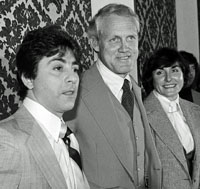
Eddie DeBartolo Jr. with Mr. and Mrs. Bill Walsh
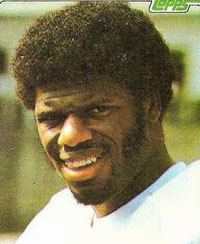
James Owens
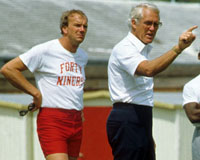
Sam Wyche watches Bill Walsh make a point
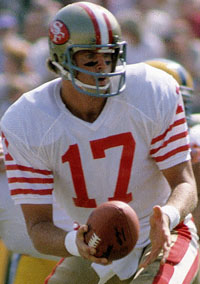
Steve DeBerg
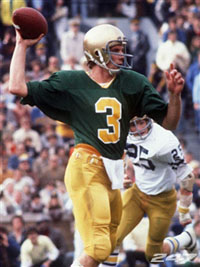
Joe Montana
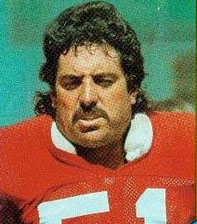
Randy Cross
|
Bill Walsh - V
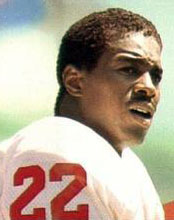
Dwight Hicks
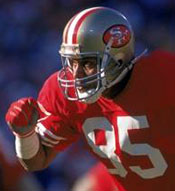
Mike Wilson
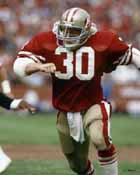
Bill Ring
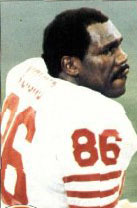
Charlie Young

Steve DeBerg
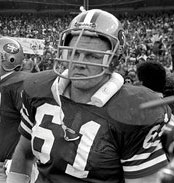
Dan Audick
|
Bill Walsh spent the off-season after his first year as 49ers head coach improving his roster.
- Given a free reign by owner Eddie DeBartolo, who called Bill "the best football coach in the country," Walsh picked up free agents Dwaine "Peewee" Board, a light but fast DE, S Dwight Hicks, WR Mike Wilson, and FB Bill Ring. All four would make significant contributions to the Niners in the years to come.
- Trades brought TE Charle Young and talented LB Thomas "Hollywood" Henderson, who wore out his welcome with Tom Landry in Dallas amid rumors of drug abuse. The latter deal would prove to be a mistake.
- The 1980 draft brought light but fast OLB Kenna Turner.
- Not believing Joe Montana, who threw only 23 passes as a rookie in '79, was ready, Bill went with veteran Steve DeBerg under C to start the season.
Walsh knew his second 49ers squad would be better but, as he recalled, "I wasn't sure just what that would look like."
- The season began with a victory at New Orleans to break the 49ers' NFL-record streak of 18 road losses in a row.
- The next week, the Niners matched their victory total for the entire '79 season with a 24-21 OT victory over the St. Louis Cardinals in the home opener.
- A cross country trip to play the Jets produced the best half the 49ers had played for Walsh. Most encouraging was the play of Montana, who took over from Steve DeBerg and threw two TD passes to Dwight Clark. The only drawback in the 37-27 victory was the defense collapsing after SF bolted to a 24-0 lead.
The euphoria the 3-0 Niners felt afterwards - DeBerg said, I'll say it right now. We're going to challenge for the divisional title. - was short-lived.
- The 49ers proceeded to lose the next eight games.
- Walsh, who took every loss as a humliating personal failure, sank deeper and deeper into despair. He recalled, After a loss, there is an enormous doubt that sets in about whether you'll ever win again. Two losses in a row, and it seems like the future is just a void, a kind of black hole in which none of the things you once had confidence in even exist. It's an emotion near panic. But I couldn't let that on to anybody. I had to make sure everybody else had their heads on straight and was ... getting ready for the next game. ... I was too sensitive for my own good. There was just this sick feeling afterward that only got worse with each new loss.
- The lowest point in the losing streak was a 59-14 Game 6 humiliation at Texas Stadium in which DeBerg completed only 12 of 35 passes and threw five INTs.
- That game provoked loud criticism of Walsh's handling on his QBs. The volume got louder the after Game 8 when DeBerg threw an INT as the Niners were driving in the last minutes of the 17-13 loss to Miami. On the transcontinental flight home, Walsh sat by himself at the front of the plane starting out the window and crying. He recalled, Sitting there in tears, I decided that I couldn't get the job done. It could be done possibly but it might take two or three more coaches to do it. It was such an overwhelming job. I wasn't embarrassed by my efforts but it just wasn't happening. I mean, eight straight losses in your second year. There was no reason to think I could make it happen. So I decided to step away at the end of the season. I was convinced I was done and planned to tell Eddie that he had to find someone else.
Back home, Bill cleared his head and made a major decision that would end the losing streak and start the franchise on an upward trajectory.
- He installed Joe Montana as his starting QB.
- The result was a three-game winning streak starting with a 12-0 shutout of the Giants and ending with a 38-35 OT victory over the Saints in which Joe led the great comeback from a 35-7 halftime deficit.
- Walsh would later say this about the victory: Modern 49ers history started there. That second half against New Orleans was where we first learned who we could be.
- Two losses to end the season made the final 1980 tally 6 wins and 10 losses.
Clearly, the Niners needed another infusion of talent if they were to reach the playoffs.
- But Walsh had to make several additions by subtraction. He cut 300lb LT Ron Singleton. His performance at that crucial position had been good but not good enough to negate the animosity Ron engendered in his teammates. He developed a reputation for taking cheap shots at practice. When the club refused to renegotiate his contract, he threw a screaming temper tantrum in the locker room, throwing things and slamming lockers. Bill felt Singleton had become a virus that infected the team. He moved 245lb G Dan Audick into the LT spot.
- The other move was made after training camp had begun. Set on Montana as their starter, Walsh and QB coach Sam Wyche decided it would be best for the club to trade DeBerg to the Denver Broncos for a fourth-round draft choice. They then executed a trade with the Dolphins to acquire Guy Benjamin, who had played QB for Bill at Stanford. Montana recalled that the changes "helped me psychologically." When Bill traded Steve, I knew the job was mine.
- The press was quick to point out that Walsh was pinning his hopes on a QB who had yet to start a full season in the NFL.
The 49ers' 1981 draft has entered NFL lore as one of the greatest ever. Since defense was the big problem, Walsh used six of his first seven picks on that side of the ball.
- Round One: DB Ronnie Lott, Southern California - 14 year career, six-time All-Pro; Pro Football Hall of Fame
- Round Two: DT John Harty, Iowa - 5 years
- Round Two: DB Eric Wright, Missouri - 10 years, 2 Pro Bowls
- Round Three: DB Carlton Williamson, Pittsburgh - 7 years, 2 Pro Bowls
- Round Five: DB Lynn Thomas, Pittsburgh - 2 years
- Round Five: KR Arrington Jones, Winston-Salem State - played in only one game
- Round Six: DT Pete Kugler, Penn State - 8 years
Armed with a much-improved defense, the 49ers were about to embark on the greatest season in franchise history.
To be continued ...
|
Building a Champion: On Football and the Making of the 49ers, Bill Walsh with Glenn Dickey (1990)
The Genius, David Harris (2016)
Top of Page
Bill Walsh - VI
Later in his life, Bill Walsh called the 1981 season "the most satisfying" of his career.
- He had improved the 49ers from 2-14 his first year as head coach in '79 to 6-10 in 1980. So '81 was a do-or-die year for him: attain a winning record or, in all probability, hit the road.
- With the offense in good shape, he used the 1981 draft to shore up his defense, which allowed the second most yards in the league in '80 (after the Saints).
The Niners started slowly, 2-2 after four games. Then they caught fire and won eleven of their next twelve.
- It started with a road win at Washington. According to Walsh, it was the first game that showed what kind of team we could be. After driving right down the field with the opening kickoff to lead 7-0, the 49ers got another TD from their defense when rookie S Ronnie Lott caused a fumble that popped into the hands of Dwight Hicks, who ran 80y to paydirt. The margin eventually reached 30-3 before the Redskins scored two late TDs.
- Before the big game the following week against Dallas, Walsh added a final piece to his defensive puzzle. Two-time All-Pro DE Fred Dean was holding out on the San Diego Chargers because they refused to renegotiate his rookie contract. So the Chargers agreed to a trade in which they received the 49ers' second-round pick in '82 and the right to switch places in the first round if the SF picked ahead of San Diego. With his salary tripled, a happy Dean took the field against the Cowboys.
- The Niners jumped on Dallas the way they did the Redskins. SF led 24-0 before the Cowboys even gained a first down. Final score: 45-14. The San Francisco Chronicle called the game the most important win since Bill Walsh took over as coach and general manager.
- Playing with supreme confidence, the 49ers won at Green Bay 13-3 and edged the Los Angeles Rams at home 20-17.
Next came a measuring stick game at Pittsburgh, home of the four-time Super Bowl champions.
- Chuck Noll's Steelers were the epitome of a "physical" team while the 49ers were trying to shed their reputation as a "finesse" team. All season, the Niners stared at a locker room sign that declared, WE WILL NOT BE OUTHIT. Walsh had each player sign it.
- The game was particularly big for QB Joe Montana, who had grown up in the Pittsburgh area. To say I was in awe of the Pittsburgh Steelers was ... an understatement, he recalled. They still had a lot of players from their (last) Super Bowl team (two years earlier). As far as I was concerned, if we could go into Pittsburgh and beat them, we were good enough to win it all. They were our litmus test. Unfortunately, Joe had badly bruised ribs that would hamper his performance.
- With both sides determined to impose their will on the other, fights broke out early and often. Two plays in a row, rookie S Carlton Williamson knocked receivers out of the game who came across the middle. Both offenses stalled before the 49er defense set up the first two scores. First, an INT by Eric Wright started a 46y drive that ended with Montana hitting Charle Young. Then Williamson recovered a fumble that led to a 10-0 halftime lead.
- But the Steel Curtain defense burned the Niners for two Q3 TDs. First, CB Mel Blount ran back an INT 50y to paydirt. Soon afterward, Joe threw another one into enemy hands that was returned 31y to set up a one-play scoring drive and a 14-10 lead for the home team. Same old 49ers. Keep the pressure on them, and they'll fold.
- Walsh's gang mounted a 68y drive that ended with a blocked FG attempt. But two more turnovers by the refitted defense finally paid off in a 43y drive that produced a go-ahead TD with 5 1/2 minutes left.
- Could the Niners hold the 17-14 lead? The answer was yes When the Steelers faced 4th-and-3, the Niners line sacked Terry Bradshaw, who afterward praised the 49er secondary, dubbed "Dwight Hicks and His Hot Licks," as the best he'd seen all year.
- Walsh joined in the jubilation in the Niners locker room. So did owner Eddie DeBartolo, who told the press, I don't want to get too excited. It's going to take another draft, another year to have a real contending club, but these kids we have are amazing. Eddie underestimated his team with that prediction.
- Several thousand fans met the 49ers' charter flight at SF International late that night.
The Niners had a letdown the next week against Atlanta but still managed a 17-14 victory.
- Their seven-game winning streak ended at home when the 4-6 Browns pulled a 15-12 upset.
- But SF started another streak the next week in a 33-31 squeaker at Los Angeles.
- The Giants fell on their home turf 17-10.
That cleared the decks for a game Walsh had pointed toward since the 1981 schedule was published.
- Bill would be making his first trip back to Cincinnati since he resigned as assistant coach when Paul Brown reneged on his promise to make Walsh his successor.
- Walsh called the 10-3 Bengals "the best team in the league by light years." With a playoff spot already clinched, Bill indicated he might rest his starters since his chance of beating Cincy was slim.
- But his team knew this was all hype for the press. Montana: The players knew that he wanted this game bad. I don't think it needed to be said.
- The Niners forced six turnovers - four by the young secondary - to dominate 21-3. Walsh's backups played as he promised but at the end of the game, not the beginning.
- In the owner's box, GM Paul Brown watched with discomfort. Walsh never talked to his old boss, but his wife Geri did. The old man seemed ill at ease.
The 49ers won two more to finish the regular season.
- A packed house at Candlestick Park saw their heroes romp over the Houston Oilers 28-6.
- The 4-11 Saints played the Niners tough in the Superdome before falling 21-17.
So San Francisco entered the playoffs for the first time since 1972.
Continued below ...
|
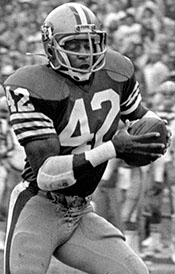
Ronnie Lott
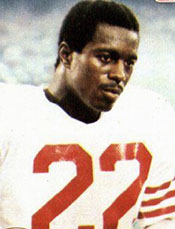
Dwight Hicks
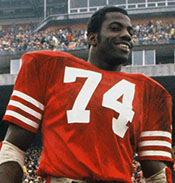
Fred Dean
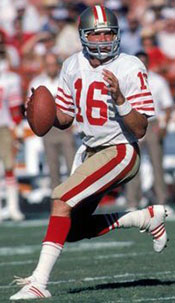
Joe Montana
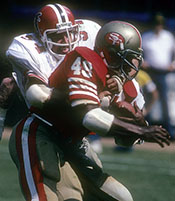
49ers-Falcons action
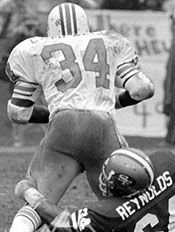
"Hacksaw" Reynolds tackles Oilers RB Earl Campbell
|
Building a Champion: On Football and the Making of the 49ers, Bill Walsh with Glenn Dickey (1990)
The Genius, David Harris (2016)
Top of Page
Bill Walsh - VII
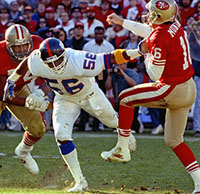
Lawrence Taylor harasses Joe Montana
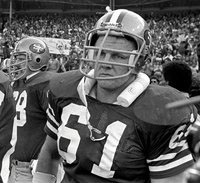
John Ayers
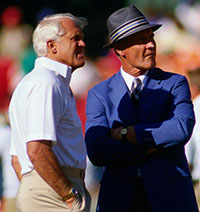
Bill Walsh and Tom Landry
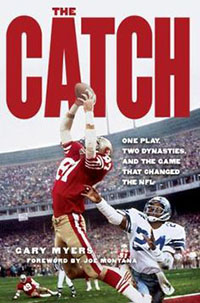
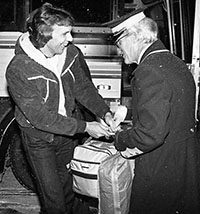
Bellhop Walsh takes Montana's bag.
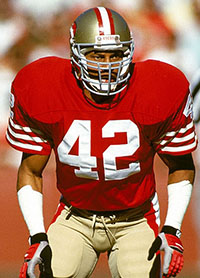
Ronnie Lott
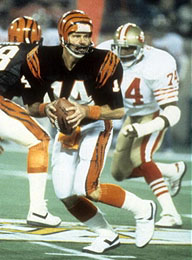
Ken Anderson, Super Bowl XVI
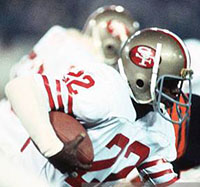
Dwight Hicks in Super Bowl XVI
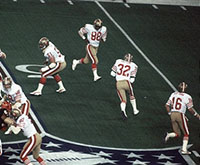
49ers reverse in SB XVI
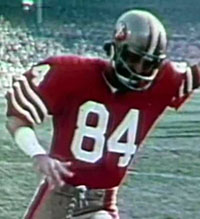
Mike Shumann
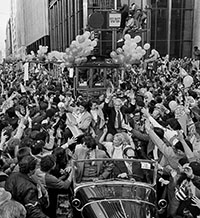
Ed DeBartolo and Bill Walsh in the 49ers victory parade.
|
In Bill Walsh's third season as head coach, the San Francisco 49ers made the playoffs for the first time in nine years.
- As winners of the NFC West, the 49ers had a week off before playing the New York Giants, who upset the Philadelphia Eagles in the NFC Wild Card game the week before. Furthermore, SF would have home field advantage throughout the playoffs because of their 13-3 record, one game better than the Cowboys.
- The Niners had beaten the Giants 17-10 during the regular season.
- Walsh encountered an unexpected problem while preparing for the playoff game - rains inundated the team's practice fields, forcing them to move down the road to Stanford.
- A gooey turf at Candlestick Park would favor the run-heavy Giants offense and make it easier for their ferocious D, led by LB Lawrence Taylor, to stifle SF's varied attack.
- Getting Taylor blocked was the biggest challenge for the offensive staff, whose game plan prescribed passes on 17 of the first 22 plays. They decided to pull LG John Ayers on passing plays to protect QB Joe Montana's blind side.
- Slowed by Ayers as well as the sloppy field, Taylor registered nary a sack as Montana completed 15 of 22 for almost 300y in the first half to take a 24-10 lead. The final tally was 38-24.
That cleared the decks for a clash with the 49ers' franchise nemesis.
- The last three times the Niners made the playoffs, they were eliminated by the same team - the Dallas Cowboys. Furthermore, Dallas won each game with a fourth-quarter comeback.
- So the game was more than the NFL Title Game. It was a grudge match.
- The 49ers had played Dallas each of the last three years. The Cowboys won the first two, 21-13 and a humiliating 59-14. But SF had spanked the Cowboys 45-14 on October 11, 1981, in Candlestick.
- A master of pyschology as well as offensive schemes, Walsh encouraged the "We hate the Cowboys" attitude of the fans and team. In speaking to his team, he referred to Tom Landry's squad as "this goddamn Dallas team" and complained that, They can't keep their mouths shut. ... They say, "This time the 49ers will be meeting the real Cowboys." Their press releases are all about how they're going to kick ass. They're so arrogant ... Nobody ever beats the "real" DallasCowboys. if they lose, there's always something missing, the airplane food isn't just right, or their accommodations are wrong. Well, I'm fed up with this bullshit. ... We're going to knock them all over the field.
- With the Bay Area still rain-drenched, owner Eddie DeBartolo flew the team to Los Angeles, where they used the Rams' facility to prepare.
- Walsh's game plan called for confusing the Doomsday Defense's front four with false reads and using two TEs and men in motion to force favorable matchups in the secondary.
- Confident that his team was quicker at every position than the Cowboys, Walsh was amazingly calm as game time approached.
- With the field in better shape than the week before, the game turned out to be a classic that was decided by Montana's off-balance pass to TE Dwight Clark in the back of the end zone in the last minute, a play immortalized as "The Catch."
- 49ers 28 Cowboys 27
Bill Walsh had rewarded DeBartolo's faith in him by bringing the 49ers to the Super Bowl in his third year at the helm.
- The opponent would be none other than the Cincinnati Bengals, also making their first appearance in the Big Game.
- The same Bengals for whom Walsh worked as offensive assistance the first eight years of the franchise, 1968-75.
- The same Bengals that had Paul Brown as their president, the man who passed over Walsh as his successor as head coach and worked to block Bill from obtaining an NFL head coach job until DeBartolo hired him.
- The Niners had defeated the Bengals at Cincinnati 21-3 in Week 14. From that point on, Walsh anticipated facing his old club again in Super Bowl XVI.
Besieged by the usual army of reporters in the week before the game, Bill denied that the history between him and his mentor had any bearing on the upcoming game.
- But he couldn't fool his players. Ronnie Lott recalled, Make no mistake. Walsh would have done anything to beat the Bengals. Although he didn't verbalize his feelings to us, it was obvious that Walsh was obsessed with showing up Brown.
- Despite their loss at home to the Niners December 6, the oddsmakers made the Bengals the favorite, thus adding more fuel to Walsh's competitive fire - as if he needed any.
- Figuring he had to come up with new wrinkles to defeat the Bengals a second time, Walsh crafted a game plan of 120 possible plays instead of the usual 80.
- Yet, Bill did a good job of keeping the team loose. Lott: He used every opportunity to turn problems and distractions into jokes and jabs to keep us from worrying too much about the game.
Walsh pulled a neat trick to keep his squad loose when they arrived at their Detroit hotel for the game.
- He traveled ahead of the team to receive the Coach of the Year award at the Washington D.C. Touchdown Club before an audience that included President Ronald Reagan and a host of other politicians.
- Arriving in the Motor City a few hours before the team, Bill dressed as a bellhop and met the team's buses arriving from the airport. He carried in a few bags before someone recognized him, setting off laughter throughout the San Francisco contingent.
Bill stayed relaxed on game day despite the fact that the team's second bus, carrying the owner and head coach, got caught in a traffic jam a half mile from the stadium.
- Walsh got on the bus's PA system and told the team they were missing the start of the game, but that the equipment manager was calling the plays, his assistant was at QB, and they'd just scored to take a 7-0 lead.
- When he finally arrived at the Pontiac Dome, he waived his ban on playing music out loud in the locker room. Bill made Montana play a Kenny Loggins song over and over on his boom box at top volume: This is it! Make no mistake where you are. This is it! ...
- Walsh didn't give a lengthy pregame speech. He simply reminded his team that they had beaten the Bengals before and predicted Cincy would be a bit gun shy.
The game started badly for the Niners but they kept their composure.
But the game was far from over.
- When the 49ers could not move out from their red zone, Cincinnati got good field position and this time put a TD on the board to make it 20-14 with 10:35 left in the game.
- At that point, SF had yet to make a first down in the second half. Later, some of the 49ers attributed their inept offense to Bill's uncharacteristic loss of nerve. WR Mike Shumann: It was the first time I ever saw Bill trying not to lose rather than trying to win. His play calling had just tightened up, and he got really conservative for the first time since he came here. I think he just wanted to beat Cincinnati so bad. Whatever the reason, there was a little rumbling on the sidelines at that point. We were all saying that we had to get more aggressive.
- On their next possession, the Niners ate up almost half the remaining time and added a FG to extend their lead to nine points.
- An interception on the Bengals' first snap after the kickoff led to another FG to make it 26-14.
- Still, the Bengals wouldn't quit. Anderson completed six straight passes, the last one for a TD with 0:20 on the clock.
The 49ers, just 2-14 two seasons earlier, were Super Bowl champions!
- The victory parade a few days later brought San Francisans together like nothing since the 1906 earthquake.
- Bill was deeply moved. I saw young people, tall people, short people, people of color, Asian people, much older people. I saw every cross section of people, all standing in unison, from the executives who came out of the office buildings to the people who clean the streets, right next to each other, screaming. It was just the most electrifying moment I’ve ever had.
- The procession ended at City Hall where the mayor presented Bill the key to the city. One of the signs in the crowd proclaimed, WHAT HATH WALSH WROUGHT?
To be continued ...
|
Building a Champion: On Football and the Making of the 49ers, Bill Walsh with Glenn Dickey (1990)
The Genius, David Harris (2016)
Top of Page
Bill Walsh - VIII
What do you do for an encore after winning the ultimate prize of your profession?
Genius or not, practical matters had to be attended to.
- The two ends of "The Catch" that beat Dallas - Joe Montana and Dwight Clark - were entering the last year of their contracts and wanted to renegotiate. Adding pressure was the fact that the league's labor agreement with the NFL Players Association was about to expire.
- So DeBartolo entered into new deals with the two stars that paid them about triple what they had received before.
- When Walsh, who opposed renegotiation of contracts, heard of the deals, he was "livid." We were trying to pay enough to keep players around but not go overboard, and that went right out the window. It wasn't so much Joe as Dwight. Joe was a QB and players expected that position to make more than everybody else, but Dwight was now the highest-paid WR in the game and that put everyone else on alert. As soon as word got out, Ronnie Lott was in my office demanding the same kind of deal.
- The 49ers moved from 27th in the league in total salary during their Super Bowl run to the top three.
How to manage the inevitable resentment and charges of favoritism and somehow keep the team focused on defending their championship? That was Walsh's challenge entering the 1982 season.
- One Super Bowl-winning coach explained the problem this way: You lose that sense of urgency. The glamour of being champions distorts what it will take to do it again and obscures the fact that you'll have to do some things better than you did before. On top of that you lose some players and everyone else is inspired to play the world champs, so you get their best game and they're not the team you see on film playing someone else. You can't sneak up on anybody. It's just real hard to climb that mountain all over again.
- The result for Walsh was what he later described as the greatest humiliation of his career with the 49ers.
- They went from 13-3 to 3-6 in a season disrupted by an unprecedented 57-day player strike that caused the cancellation of seven weeks worth of games.
- To compensate for the lost games, the NFL set up a 16-team playoff consisting of the eight teams in each conference with the best record.
- Walsh's club finished 11th in the NFC, one game behind their longtime division whipping boy, the Saints, who defeated the Niners 23-20 in their only meeting of the abbreviated season.
- Compounding Bill's ability to lead his team was the fact that his squad had split about 50-50 on whether to strike, with neither side able to understand the other side's point of view. The team kept postponing their strike vote until the deadline approached and, with Walsh urging them to be unified in whatever they did, they agreed to go along with the strike.
- Eventually, the union caved in and ended the walkout with virtually no gains to show for it. Montana recalled: We simply were divided on the issue and could never regroup. ... When the strike was over, no one forgot what happened. ... There were grudges and we weren't playing as a team. ... The season was ruined for us.
- But the strike wasn't the only culprit. As often happens with a championship team, players got fat, sluggish in the head, heart, and body, said TE Charley Young. We had too many guys writing books, assistant coach John McVay observed. The #1 star, Joe Montana, taped a weekly TV show and traveled the country on his off days to fulfill commercial opportunities arranged by his agent.
- Making matters worse was the increased drug use on the team with players snorting cocaine at team parties and even in the hotel the night before games.
- Needless to say, Walsh was despondent and exhausted when the debacle of a season ended.
How to put the 1982 nightmare behind them and recreate the cohesion that marked the championship season of 1981? That was the question facing Walsh heading into a new season. Could Humpty Dumpty be put back together again?
- First, Bill had to overcome his own depression that made him talk about quitting coaching. A tongue-lashing from a few friends, including Bears GM Jim Finks, shook him out of his self-pity. Bill decided to give up the General Manager's position and continue only as head coach.
- He made one important change in his coaching technique. Randy Cross explains, Bill was very personable early on - in 1979, '80, '81. I think that whole experience in '82, between the strike and losing like we did, affected his relationship with us. That was a turning point for Bill. We had all built up so much trust between us in 1981 and then we totally abused it and misused it. He never made that mistake again. From that point on he was different: further away, more protected.
- Many 49ers, notably Montana and Lott, were upset with Bill because he failed to show for the team meeting the Monday after the last game of the disastrous '82 season. Walsh explained that he was too angry at the players and emotionally disturbed. But the players took his absence as washing his hands of them and not giving them credit for feeling badly about the season also.
- Bill continued to make jokes and call players by their first names at practice, but he kept relationships more on a professional level and created an atmosphere that could best be described as "creative tension," including friction with his star QB.
Fortunately, the 49ers still had a talented squad.
- Buoyed by a contract extension from DeBartolo, Bill prepared for the 1983 NFL draft, which produced three players who would make a strong contribution to the 49ers.
Round 2 - RB Roger Craig - eight seasons, winner of 1988 NFL AP Offensive Player of the Year award; member of Pro Football Hall of Fame 2nd team All-1980s Team; Pro Football Reference 1st team All-1980s Team
Round 5 - LB Riki Ellison - six years as starting LB
Round 11 - C Jesse Sapolu - nine seasons as starting C
- Walsh also obtained speedy HB Wendell Tyler, who twice gained 1000y for the Rams, who were planning to draft Eric Dickerson in the 1st round. Tyler would team with Craig to form a solid backfield combo for the next three seasons.
- Bill said goodbye to three assistant coaches and made an important decision to promote George Seifert from DB coach to D coordinator. George quickly won the respect of his veteran unit because of his thoroughness and expertise in plotting game plans for the increasingly high-powered offenses in the league.
San Francisco rebounded to win the NFC West with a 10-6 record.
It would be 16 years before the 49ers would win fewer than 10 games in a season.
Continued below ...
|
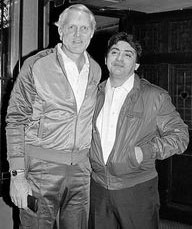
Bill Walsh and Eddie DeBartolo Jr.
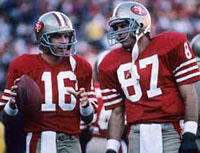
Joe Montana and Dwight Clark
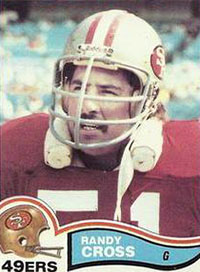
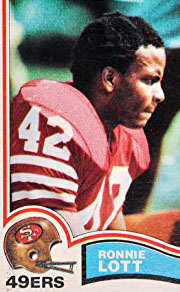
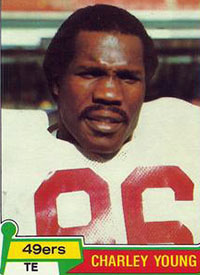
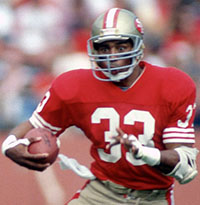
Roger Craig
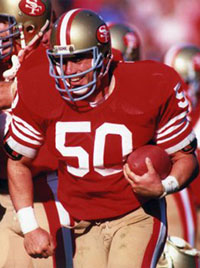
Riki Ellison
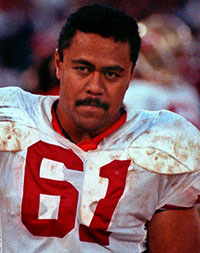
Jesse Sapolu
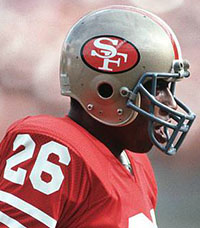
Wendell Tyler
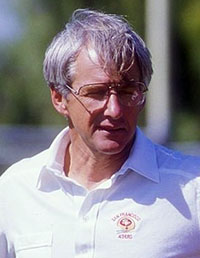
George Seifert
|
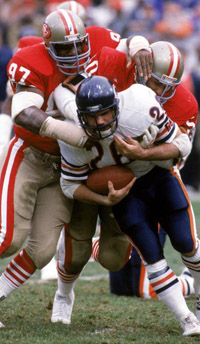
Gary "Big Hands" Johnson (97)
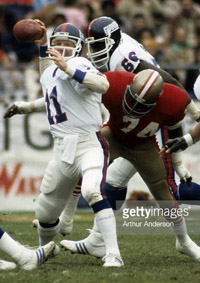
Fred Dean harasses Giants QB Phil Simms in 1984 playoff game
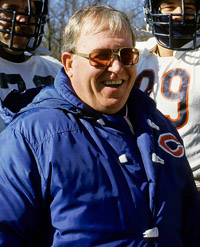
Buddy Ryan
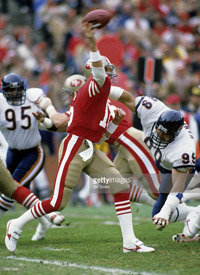
Joe Montana passes against the Bears in 1984 NFC Championship game
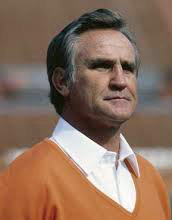
Don Shula
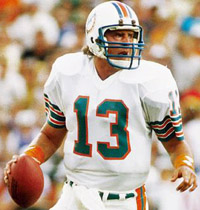
Dan Marino
|
Bill Walsh - IX
The gut-wrenching playoff loss that ended the 1983 season became a big source of motivation for the 49ers going into 1984.
- The team didn't point fingers but instead dedicated themselves to making sure 1984 would not have a disappointing ending.
- For the first time, Bill Walsh wasn't looking to fill holes in his lineup but instead concentrated on adding depth. His biggest need for NT. So he made a trade with San Diego to acquire Gary "Big Hands" Johnson, a pass rush specialist.
- As GM, Bill also had to settle the holdouts of two key defensive players: S Ronnie Lott and DE Fred Dean. Lott settled his contract dispute in time for training camp, but Dean, threatening to sit out the last year of his current contract, didn't sign until halfway through the regular season.
- Despite those difficulties, Walsh was more confident about his team's chances for the upcoming season than any of his previous five years as head coach. Lott called the '84 Niners "the most talented team I've ever been around."
The team lived up to its billing.
- The 49ers ripped off six straight wins to start the season before losing to the Steelers at home.
Walsh wrote in his autobiography: Our only loss was a close, hard-fought game to Pittsburgh decided by a "phantom" goal-line pass interference call ... (Pittsburgh coach) Chuck Noll was very gracious about that later. He, too, questioned the call but told me, "You're going to go all the way." This loss may have sharpened us for the remaining games because it reminded us that anything could happen.
- They would not lose again all season to become the first NFL team to win 15 regular season games. The 49ers finished strong, winning their last four games by a combined margin of 100 points.
- Walsh was rewarded with the Coach of the Year award.
With the best record in the NFC, they enjoyed a bye week before starting the playoffs.
- San Francisco defeated the Giants in a game in which they jumped out to a 14-0 lead. That enabled Walsh to simplify his game plan so as to save portions of it for the next game. The result was a workmanlike 21-10 victory.
- That set up a monumental NFC title game clash with the Bears. The game was billed as the battle of the Defensive Genius, Chicago D-coordinator Buddy Ryan, and the Offensive Genius, Bill Walsh.
- The prevous season the Bears defense had shut down the 49ers in a 13-3 victory in a sleet storm in Chicago. After that game, Ryan derided the Walsh's offense as "predictable." Now the Bears defense proclaimed that they were too tough for a "finesse team" like the Niners.
- Ryan had invented the "46 defense" that put eight men on or close to the line of scrimmage so that the offense didn't know which defenders would blitz and which would drop back into coverage. One columnist wrote that Walsh is scared to death of the Bears ... He has yet to prove he can handle Chicago's defense.
- Walsh was nervous but not scared. He developed a game plan to deal with the vaunted 46 D. Since the Bears never blitzed both a MLB and an OLB, he assigned one or the other of his guards to swing wide to get the outside blitzer. He also held the RBs in full blitz protection on every pass, releasing into the flat for a pass only if all rushers were accounted for. The final part of his plan involved QB Joe Montana using only three-step drops to get passes away quickly. Completing short passes would open up the running game.
- The plan worked beautifully. "We moved the ball at will," Montana recalled, "and the Bears defense couldn't stop us." Only a couple of Joe's mistakes kept the game close through the first half. The dominating defense wore red and gold, not blue and orange. The 49ers got nine sacks and received praise from a Bear O lineman afterward. He said the SF defense "reminded me of ours. They were coming from all different directions." Leading only 6-0 at halftime, the Niners offense avoided turnovers to pull away 23-0. Afterwards, Ryan grudgingly admitted, "The real Genius prevailed."
In his autobiography, Walsh proclaimed: It was a very satisfying win. ... Yes, I was aware of Buddy Ryan's belittling remarks before the game and I thought how sweet it would be to take apart that defense, but a momentary thought was all I could give it. You simply cannot allow yourself to believe emotions alone will win the game.
The Super Bowl pitted Walsh against a veteran coach for whom he had great respect.
- Don Shula's Miami Dolphins had finished 14-2 in the regular season, then manhandled the Seahawks and Steelers in the playoffs.
- His second-year QB, Dan Marino, had broken numerous single-season NFL passing records while the "Killer B's" defense was almost unanimously rated better than the Niners.
- So the 49ers were considered underdogs despite the fact that the Big Game would be played at Stanford Stadium, just down the road from Frisco.
- When Walsh studied video of the Dolphins, he saw a team that was not as talented and deep as his own. He later said, "Frankly, I thought that for Miami to have gone 14-2 and won two playoff games was a real tribute to Don."
Nevertheless, Miami started strong.
- After the Niners did nothing with the opening kickoff, the Dolphins came out in a no-huddle offense that moved down the field for a FG.
- The Niners responded with a 78y drive for a TD to take a 7-3 lead.
- But Miami answered with a TD drive of their own as the Niners still had not figured out how to defend the no-huddle attack.
- But SF D-coordinator George Seifert, who didn't have time to make situational substitutions against the fast-paced Dolphin offense, decided that the Miami running attack was practically non-existence. So he played the nickel defense the rest of the game. The Dolphins were held to just two more FGs.
- Meanwhile, Montana had what Walsh would later describe as "his greatest game" to earn the MVP award. Final score: San Francisco 38 Miami 16
- One Bay Area writer claimed that "Walsh proved his is the best mind in football ... Walsh's greatness is that he made the second-best team in the league look bad."
- Bill was especially moved afterward when the squad awarded him the game ball.
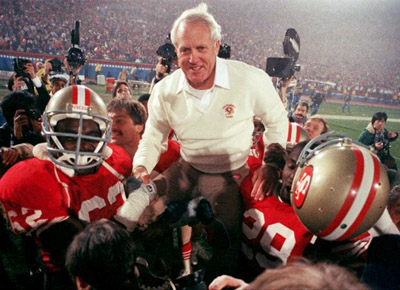
Bill Walsh enjoys Super Bowl XIX victory
Continued below ...
|
Bill Walsh - X
After the 49ers' victory in Super Bowl XIX, the talk in the Bay Area was that Bill Walsh was retiring.
- However, owner Eddie DeBartolo ended that speculation by replacing the two years left on Bill's contract with a new four-year deal that would pay him almost $1 million a year.
- That doubled his salary and made him the highest paid coach in the NFL.
Not one to stand pat, Walsh looked for ways to improve his Super Bowl champions.
- He focused on WR Freddie Solomon, who had been plagued by injuries the past two seasons. When he was out of the lineup, the 49er offense had no deep threat, and defenders could press the other receivers and thwart the horizontal passing game.
- The college receiver who caught Bill's eye played for tiny Mississippi Valley State - Jerry Rice. The problem was that the 49ers picked 28th in the first round, and Walsh feared his hidden gem would be off the board by then.
- So he worked a deal with the Patriots to exchange the Niners' 1st-, 2nd-, and 3rd-round picks for New England's #16 spot in the first round. This was done against the vociferous objections of Bill's Scouting Director, who rated Rice only #5 among WRs.
- Sure enough, Jerry was available, and Bill selected him. Jerry, of course, would turn out to be one of Bill's great draft picks, right up there with Joe Montana and Ronnie Lott.
Walsh became aware of Rice's prowess by luck. When the 49ers were in Houston to play the Oilers, the local sports news showed highlights of Rice. Bill recalled: He was sensational. People would argue that the level of competition wasn't high because it wasn't Division One, but what I saw was just a sensational player, regardless of the competition. I vividly remember thinking, "Damn, we're going to have to play against that guy."
1985 showed once again that it's harder to defend a championship than to win one in the first place.
- After starting the 1985 season 5-5, the 49ers finished 10-6, but that wasn't enough to win the NFC West because the Los Angeles Rams finished 11-5.
- Rice got off to a poor start. He kept dropping passes thrown right to him. He also missed several games with a shoulder injury. Jerry finally started playing up to his ability the last six games, helping the Niners to win five of them.
Walsh: He was just anxious catching the ball, wanting to run with it before he caught it. The fans weren't very nice to him when he started dropping balls and that hurt him a lot more than I thought it would, made him anxious. I had to work at keeping his confidence up. I'd talk to him personally. I gave him examples of people who had disappointed themselves and others initially and then became great players. I sort of embellished it a bit but I knew he'd work through it.
- The Niners made the playoffs as a wild card. However, the season had taken a heavy toll and, with many walking wounded, SF lost in the first round to the Giants 17-3 at the Meadowlands.
After holding the 49ers to three points, Giants head coach Bill Parcells asked, What do you think of that West Coast offense now? Unintentionally, Bill gave Walsh's offense the name it has been known by ever since.
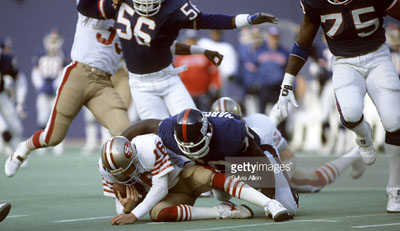
Leonard Marshall sacks Montana in the 1985 Wild Card game.
Walsh had only four new players on his roster in 1985. He would have many more than that the following season.
- Perhaps the most significant change occurred on the coaching staff. QB coach Paul Hackett left to become the Cowboys' O-coordinator and was replaced by Mike Holmgren, who had coached QBs at Brigham Young the last four years. Believing that BYU had "the most sophisticated passing offense in college football," Walsh hired Holmgren over several well-regarded candidates who had NFL experience.
- Not convinced that the college players mentioned as first round possibilities were that outstanding, Bill traded down to collect as many draft choices as possible. That strategy produced DE Larry Roberts, RB Tom Rathman, DB Tim McKyer, WR John Taylor, DE Charles Haley, OT Steve Wallace, DE Kevin Fagan, and DB Don Griffin. Even though his director of scouting told Bill the draft had been a disaster, all eight would become starters, with five playing in the Pro Bowl.
The changes did not result in immediate success - at least not the success that 49er fans had come to expect.
Continued below ...
|
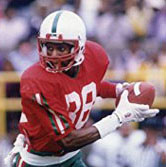
Jerry Rice
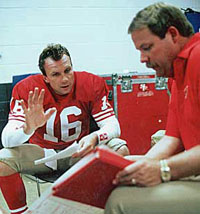
Mike Holmgren with Joe Montana
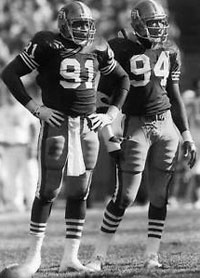
Larry Roberts (91) and Charles Haley
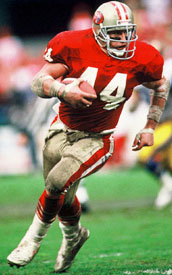
Tom Rathman
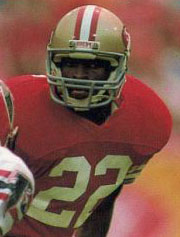
Tim McKyer
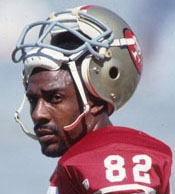
John Taylor
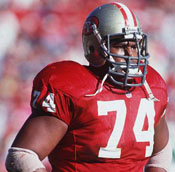
Steve Wallace
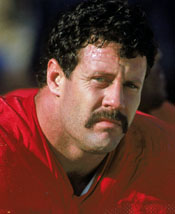
Kevin Fagan
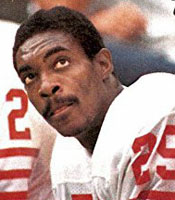
Don Griffin
|
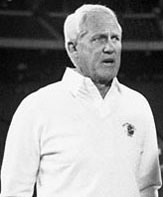
Bill Walsh 1987
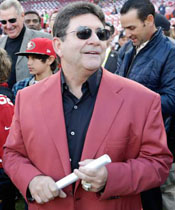
Eddie DeBartolo 1987
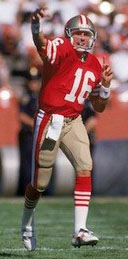
Joe Montana 1987
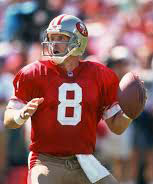
Steve Young
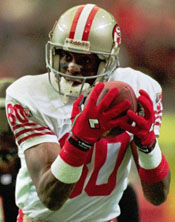
Jerry Rice
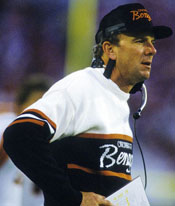
Sam Wyche
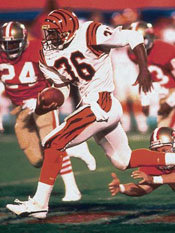
Stanford Jennings returns kickoff for TD in SB XXIII
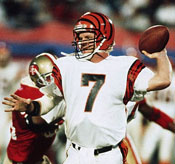
Boomer Esiason
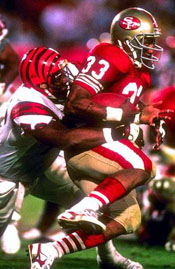
Roger Craig
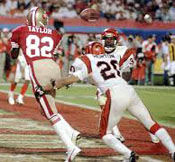
John Taylor's Super Bowl catch
|
Bill Walsh - XI
As the 1987 season approached, most everyone in the NFL assumed there would be a player strike.
- The 49ers worked harder than most teams to be ready when the strike occurred. We established a complete subprogram to secure and develop replacement talent, recalled Bill. That took much more time and effort by our coaches and staff, but it ultimately paid off.
- When the strike hit after two regular season games, the 49ers were ready with players who had been on the squad previously or in the preseason camp.
- In addition, Walsh had a major group of eleven players who wanted to come back, including stars like Joe Montana, Dwight Clark, Roger Craig, Jeff Fuller, and Russ Francis. But he was caught in the middle between these players and the team leaders, who urged him to wait a week when a larger contingent of players would return. Bill was torn because he figured his replacement team could beat the ersatz Giants in the first game after the strike.
- Against the wishes of the league, which wanted to welcome any stars who wanted to play in Week 4 but with the backing of owner Eddie DeBatolo, who said, "I don't care what the NFL tells us to do. We're going to do what's right for our squad," Bill persuaded the eleven veterans to wait a week and beat the Giants handily, 41-21, with his replacement squad.
- The Montana group returned the following week and beat the Falcons in Atlanta 25-17 before coming from behind at home to down the St. Louis Cardinals 34-28 the next week.
Putting Humpty Dumpty back again after the strike required some skillful diplomacy. Some players who stayed out throughout the strike said they could never feel the same way about their teammates who had returned.
- Walsh called a team meeting and explained his position of trying to keep the team together and told the adamant strikers that players who returned early did so because (a) they were loyal to the 49ers organization, (b) they didn't agree with the union's position, or (c) they experienced dire financial circumstances.
- Bill recalled, During my presentation, positions began to soften. ... When that meeting ended, there was still some animosity, but most of it had begun to subside.
San Francisco finished the season with the best record in the league, 13-2.
- They won the NFC West by one game over the upstart New Orleans Saints, who made the playoffs for the first time in franchise history.
- But after enjoying a bye week, the 49ers were shocked 36-24 by the Minnesota Vikings, who had eliminated the Saints the week before. Walsh called it as bitter and difficult a loss as we've ever had.
- How did it happen? asked Bill in his autobiography. It was a combination of meeting a Minnesota team that was playing very well and not being ready for the game ourselves, for a variety of reasons, many of them originating with me.
- One of the reasons he cited was overconfidence following their clobbering of the Rams 48-0 in the final game of the regular season. Bill regretted not calling off the dogs in the final period. He also admitted that he worked the team too hard in practice during the two weeks before the playoff game.
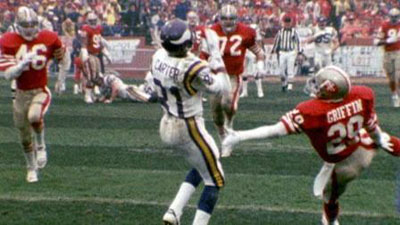
1987 Vikings-49ers action
As the 49ers moved into a new facility for the 1988 season, Walsh faced a QB controversy.
- Steve Young had come to the 49ers for the 1987 season in a trade from Tampa Bay, where he had been considered a bust.
- But Young, in Walsh's words, had shown that he had the ability to be the 49er QB. Whenever he'd played as a 49er, he'd been not only productive but exciting. The former Brigham Young star provided a dimension that Joe Montana didn't - the ability to beat a defense with his feet.
- However, Bill insisted that Montana was his starter for the 1988 season despite the fact that Steve performed better in the preseason. My only concern about Montana was his health, recalled Bill.
That concern came to the fore in the first game of the regular season.
- In the Niners' thrilling 35-34 victory over the Saints, Joe hurt his elbow when he banged it on the artificial turf in the Superdome. To make matters worse, Joe suffered from dysentery the following week.
- So Young started Game 2 against the Giants in New York. But with the scored tied at 10 at halftime, Bill sent in Joe who pulled out the 20-17 victory with a 78y pass to Jerry Rice with 42 seconds left.
- While still not at full strength, Joe continued to start. After a shocking loss to Atlanta, the Niners - and Montana in particular - played an excellent game against Seattle.
- But SF lost four of their next seven to sink to 6-5. During that stretch, Walsh decided that Montana would never regain full health without some rest. So he started Steve in back-to-back games against Minnesota and Phoenix - a win and a loss.
- With Joe back in the saddle for the stretch run, the Niners lost to the Los Angeles Raiders, then ripped off four straight wins, including a 30-17 triumph over the Saints to wrap up the NFC West with a week to play.
Their 10-6 record was good enough to give the 49ers a first round bye in the playoffs.
- They got revenge on the Vikings 34-9 before thumping the Bears 28-3 on a cold and windy day in Chicago to earn a trip to Super Bowl XXIII. Walsh called them two of the very best games ever played by the 49ers.
- Montana was sensational: 33-for-54 for 466y, six TDs, and only 1 INT.
Walsh had privately decided to retire as coach after the Super Bowl, win or lose.
- The stress of the strike season of '87 and the up-and-down '88 year had taken their toll on him.
- He didn't announce his decision because he did not want to create a distraction heading into the Big Game.
The opponent in the Super Bowl was the same one the Niners had faced in their first Super Bowl in 1982 - the Cincinnati Bengals.
- The difference, though, was that Paul Brown's former team was now led by Walsh's protege and old friend, Sam Wyche. Sam had presided over the Bengals' sensational turnaround from 4-11 during 1987 to 12-4.
- While telling everyone that the Bengals posed an enormous challenge, Bill privately thought that he had a much stronger and more experienced team.
In the end, the 49ers won because they had Superman, AKA Joe Montana, on their team.
- The first half was surprisingly low scoring, ending in a 3-3 tie.
- After the teams exchanged FGs in Q3, Cincinnati took the lead on a 93y kickoff return by Stanford Jennings.
- But Montana found Jerry Rice on a 14y TD pass to complete an 85y drive to tie the game for the third time.
- The Bengals started a possession on their own 32 with 8:47 left in the game. Boomer Esiason completed only two passes but Icky Woods gained 21y rushing to set up Jim Breech for a 40y FG to make it 16-13 with only 3:20 on the clock.
- But that was more than enough time for Montana to work his magic. He completed five straight passes to place the pigskin on the Cincy 48 with 1:54 to go.
- After an incompletion and a penalty, he hit Jerry Rice for 27y to the 18. After a short one to Roger Craig for 8, Montana found John Taylor in the EZ to complete the greatest clutch drive in Super Bowl history and take a 20-16 lead with 0:34 on the clock.
- When Esiason's 4th down pass fell incomplete, the Niners wrapped up their fourth Super Bowl victory without a defeat under Bill Walsh.
Walsh quit while on top and became a commentator on NBC's football broadcasts.
- But he couldn't resist returning to coaching in 1992 when he started a second stint as head coach of Stanford. After a successful first season in which the Cardinal went 10-3 and ranked as Pac-10 co-champions, he retired from coaching for good after two losing seasons.
- Walsh became Vice President and General Manager for the 49ers from 1999 to 2001 and continued for three years after that as a special consultant.
- In 2004, he became a special assistant to the Stanford AD.
- Bill died of luekemia in 2007.
References: Building a Champion, Bill Walsh with Glenn Dickey (1990)
The Genius, David Harris (2016)
|
|
CONTENTS
Dak Prescott
Bill Walsh - I
Bill Walsh - II
Bill Walsh - III
Bill Walsh - IV
Bill Walsh - V
Bill Walsh - VI
Bill Walsh - VII
Bill Walsh - VIII
Bill Walsh - IX
Bill Walsh - X
Bill Walsh - XI
Football Profiles - I
Football Profiles - II
Football Profiles - III
Football Profiles - IV
Football Profiles - V
Football Magazine
Golden Rankings Home |












































